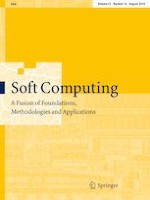12.07.2018 | Methodologies and Application
A framework based on evolutionary algorithm for strategy optimization in robot soccer
Erschienen in: Soft Computing | Ausgabe 16/2019
EinloggenAktivieren Sie unsere intelligente Suche, um passende Fachinhalte oder Patente zu finden.
Wählen Sie Textabschnitte aus um mit Künstlicher Intelligenz passenden Patente zu finden. powered by
Markieren Sie Textabschnitte, um KI-gestützt weitere passende Inhalte zu finden. powered by
